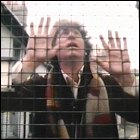 The Doctor and Romana come to St. Cedds College,Cambridge, to visit an old friend named Professor Chronotis. He has an item that they’ve come to retrieve on behalf of the Time Lords, for Chronotis is himself a renegade Time Lord in hiding, and he’s in possession of “The Worshipful Law of Ancient Gallifrey,” a book containing immense secrets. But the Doctor and Romana quickly realize that they’re not the only ones trying to find Chronotis and his stolen book. A ruthless criminal, Skagra, hopes to find the secret location of the Time Lords’ prison planet, Shada, where he means to release one of the most dangerous Gallifreyans in the history of the galaxy and gain his secret for controlling the entire universe with his mind alone. When he realizes that there are already Time Lords on the scene trying to get the book for themselves, Skagra adds the Doctor and Romana to his list of targets. But not even Chronotis has the book – he accidentally loaned it to two of his students at the college, who has carbon-dated it to an impossible age; those students are also hunted by Skagra. But once the chase brings the Doctor and friends to Shada itself, they learn something even more horrifying: the most dangerous criminal in history, the man Skagra hoped to befriend, is no long imprisoned there. Instead, he’s been with the Doctor all along.
The Doctor and Romana come to St. Cedds College,Cambridge, to visit an old friend named Professor Chronotis. He has an item that they’ve come to retrieve on behalf of the Time Lords, for Chronotis is himself a renegade Time Lord in hiding, and he’s in possession of “The Worshipful Law of Ancient Gallifrey,” a book containing immense secrets. But the Doctor and Romana quickly realize that they’re not the only ones trying to find Chronotis and his stolen book. A ruthless criminal, Skagra, hopes to find the secret location of the Time Lords’ prison planet, Shada, where he means to release one of the most dangerous Gallifreyans in the history of the galaxy and gain his secret for controlling the entire universe with his mind alone. When he realizes that there are already Time Lords on the scene trying to get the book for themselves, Skagra adds the Doctor and Romana to his list of targets. But not even Chronotis has the book – he accidentally loaned it to two of his students at the college, who has carbon-dated it to an impossible age; those students are also hunted by Skagra. But once the chase brings the Doctor and friends to Shada itself, they learn something even more horrifying: the most dangerous criminal in history, the man Skagra hoped to befriend, is no long imprisoned there. Instead, he’s been with the Doctor all along.
written by Douglas Adams
directed by Pennant Roberts
music by Keff McCulloch (1992 video release; if finished, Shada almost certainly would have been scored by Dudley Simpson)Guest Cast: Denis Carey (Professor Chronotis), Daniel Hill (Chris Parsons), Victoria Burgoyne (Clare Keightly), Christopher Neame (Skagra), Gerald Campion (Porter), Derek Pollitt (Caldera), John Hallett (Constable), David Strong (Passenger), Shirley Dixon (Ship), James Coombes (voice of Krargs), Harry Fielder (Krarg Commander), Lionel Sansby, James Muir, Derek Suthern, Reg Woods (Krargs)
Notes: Shada was never finished and broadcast, due to a series of industrial strikes at the BBC which pushed the final studio shooting sessions back until they fell off the schedule and the six-parter missed its broadcast date; this had the rather unenviable effect of making The Horns Of Nimon – considered by more than a few fans to be one of the lowest points in the series’ history – the swan song of producer Graham Williams. Incoming rookie producer John Nathan-Turner looked into salvaging Shada for broadcast, possibly as a Christmas special, but was unable to secure additional funding for this, much less schedule all of the necessary cast members again at the same time. As such, the public’s first glimpse of Shada was in the form of clips incorporated into 1983’s The Five Doctors, which served as “new footage” of the fourth Doctor to cover for Tom Baker’s absence from that story. Shada‘s existing studio and complete location footage later saw release on VHS in 1992, with Tom Baker narrating those scenes which hadn’t been shot; the story was also completely re-recorded – in audio form only – with Paul McGann as the eighth Doctor, with revised dialogue indicating that the Doctor and Romana’s original visit to St. Cedds having indeed been interrupted by their capture in The Five Doctors. The late Douglas Adams, for whom Shada also would have been his final work on the show, later offered his view that the story wasn’t that noteworthy or exceptional, except in the minds of the show’s fans due to its mysterious “unfinished” status.
Review: In 1979, the grand finale of Doctor Who’s seventeenth year on the air was scheduled to be the six-part Shada, written by “Hitchhiker’s Guide to the Galaxy” scribe Douglas Adams and starring Denis Carey and Christopher Neame (who appeared as the interrogator in the Babylon 5 episode And The Sky Full of Stars and a Viking warrior in the Heroes And Demons episode of Star Trek: Voyager), alongside the then-current team of Tom Baker’s Doctor and Lalla Ward as Romana, with K-9 in tow. But due to a studio workers’ strike at the BBC, Shada had to be cancelled with only a few days’ more studio work required to complete the story. All of the location filming and one of three studio sessions were already in the can, and because of the labor disputes, that’s where they remained. Two short excerpts of the location footage were used to represent the fourth Doctor in the 1983 twentieth-anniversary special, in which Baker declined to appear. Many elements of Douglas Adams’s novel “Dirk Gently’s Holistic Detective Agency” were lifted straight out of the Who script and became a little more surreal and humorous for the printed page, but Shada itself remained a total enigma for over a decade. Until, as they say, now.
Blazing onto videotape in a dubious cloud of glory, one wonders if perhaps Shada‘s legendary status among Who fans hasn’t been attained merely because of the “long-lost” nature of the story. It might have retained its mysterious luster had it remained buried in the BBC’s video vaults, but in the ever-increasing crunch for new and interesting material to put on the retail shelves, it was inevitable that Shada would finally arrive in the stores. One of the most irritating and simultaneously irritating aspects of this video is Tom Baker himself. Not his portrayal of the Doctor, mind you – his performance in the 1979 footage is as solid and entertaining as ever, as is that of Lalla Ward, the companion with whom Baker’s Doctor had the best rapport, though K-9 still grates on my nerves. Tom Baker, circa 1993 in subdued mood lighting, narrates the portions of the story that never made it to film. But is it really Tom Baker? Or is it the Doctor? The whole time, Tom relates the Doctor’s missing scenes in the first person perspective, making one wonder if he’s lapsed back into his days as the definitive Time Lord a little too far.
 Where the actual Shada footage is concerned, it doesn’t take a lot of close examination to tell that it would’ve been one of the better stories of the much-maligned 1979 season. Christopher Neame is always in fine form as a slippery bad guy, and Denis Carey, who has appeared in other episodes of Doctor Who and Blake’s 7, contributes much to any of his guest appearances with his haunting voice alone. His portrayal of a doddering old Time Lord masquerading as a Cambridge history professor finally allows him to delve further into the physical aspect of his role than usual. This tape may also go down in history as the Tom Baker outing with the best special effects – of course, they were all assembled in 1993 with much more modern technology than the BBC would have had at its disposal when the show was filmed!
Where the actual Shada footage is concerned, it doesn’t take a lot of close examination to tell that it would’ve been one of the better stories of the much-maligned 1979 season. Christopher Neame is always in fine form as a slippery bad guy, and Denis Carey, who has appeared in other episodes of Doctor Who and Blake’s 7, contributes much to any of his guest appearances with his haunting voice alone. His portrayal of a doddering old Time Lord masquerading as a Cambridge history professor finally allows him to delve further into the physical aspect of his role than usual. This tape may also go down in history as the Tom Baker outing with the best special effects – of course, they were all assembled in 1993 with much more modern technology than the BBC would have had at its disposal when the show was filmed!
Adding to the annoyance factor, however, is the distracting episodic format, which brings the story’s five “cliffhangers” to a close with the traditional full end credits and then opens the next segment with the full opening sequence. Normally this is a wonderful touch when included in other Who videos, as the multi-part format is the way the show was originally conceived. But with Shada, it is distracting and unnecessary due to this story’s unique demands. Despite Baker’s skill in narrating the action, it is somewhat ludicrous when at least two of the cliffhangers end on his recitations. Adequate for filling the gaps in the available footage, Baker’s narration isn’t exactly radio drama; it is, in fact, underplayed and in a few places anticlimactic. When you have to fast-forward through two or three minutes of credits to pick up where you just needlessly left off, it gets irritating.
The failings of its presentation aside, Shada is a very watchable story. The actual footage, seen for the first time, is a reminder of just how good Tom Baker was as the Doctor, and how enjoyable the series was as this oft-criticized point in its history. Add to this the fact that it’s a Doctor Who you’ve never seen before, and you may be able to overlook the shortcomings.
Additional Note: If there’s a Dalek locked up in the prison on Shada, what makes that one Dalek so much more dangerous to the Time Lords than the rest of them? If you’ll allow a dash of retcon, perhaps this is actually our first view of Dalek Sec, leader of the Cult of Skaro.
LogBook entry & review by Earl Green
